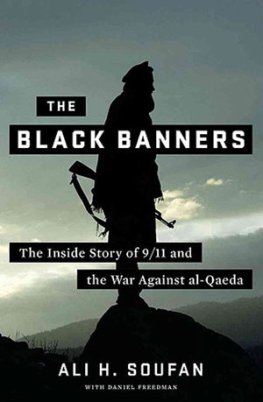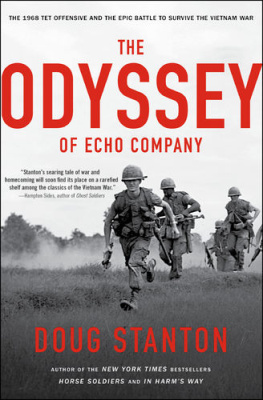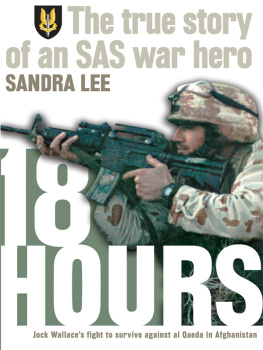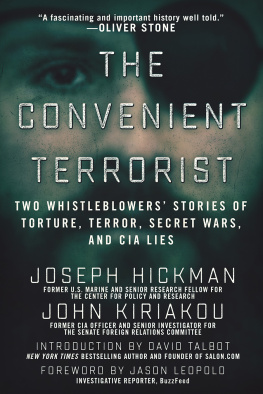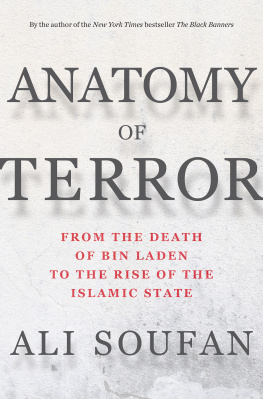THE
BLACK BANNERS
DECLASSIFIED
How Torture Derailed the War on Terror after 9/11
ALI SOUFAN
with Daniel Freedman

For Heather, Connor, Dean, and Dylan
my peace of mind
CONTENTS
MAP
FOREWORD
PROLOGUE
NOTE TO READERS
PART 1 THE EARLY YEARS
1.The Fatwa and the Bet
2.Osama Air
3.The Northern Group
PART 2 DECLARATION OF WAR
4.The al-Qaeda Switchboard
5.Operation Challenge and the Manchester Manual
6.Youll Be Singing Like a Canary
7.Millennium Plot
PART 3 USS COLE
8.A Naval Destroyer in Yemen?
9.The Hall of Death
10.Were Stubborn, but Were Not Crazy
11.The Human Polygraph Machine
12.What Is al-Qaeda Doing in Malaysia?
13.Bin Ladens Errand Boy
PART 4 THE ATTACK THAT CHANGED THE WORLD
14.The Binalshibh Riddle
15.What Dots?
16.The Father of Death
PART 5 A NEW WORLD ORDER
17.Bin Ladens Escape
18.DocEx
19.Black Magic
PART 6 THE FIRST HIGH-VALUE DETAINEE
20.Abu Zubaydah
21.The Contractors Take Over
22.We Dont Do That
PART 7 SUCCESSES AND FAILURES
23.Guantnamo Bay
24.45 Minutes
25.The Crystal Ball Memo
PART 8 FINAL MISSIONS
26.Leaving the FBI
27.Undercover
POSTSCRIPT
CONCLUSION
ACKNOWLEDGMENTS
PRINCIPAL CHARACTERS
KEY DOCUMENTS AND ARTICLES CITED
PHOTOGRAPH CREDITS
INDEX

FOREWORD
The publication of this new edition of The Black Banners is an event of historic significance. When the book was first published, the Central Intelligence Agency insisted that large portions of it be cutredacted, in intelligence-speakfor what it claimed were reasons of national security. On many pages the redactions were so severe that there were more black lines than complete sentences, and the narrative was unintelligible. These were often the most important passages in the book. Now, the CIA has recognized that its own redactions were unwarranted, and it has reversed its decision. That in itself is a victory for freedom of information.
Moreover, the book corrects the record on a crucial matter of national security. Following 9/11, the CIA adopted so-called enhanced interrogation techniques (EITs)in plain language, tortureas a means of extracting information from terrorist suspects. These techniques produced no actionable intelligence, as we know from the findings of the agencys own inspector general. But certain politicians and officials muzzled this truth for the sake of their own reputations. They censored critics of the techniques, while allowing proponents to speak freely. Thus emboldened, the torturers could paint a straightforward yet misleading picture: simply waterboard a suspect and the intelligence would flow. In response, those of us who knew the truth could offer little besides bare denials. When challenged to explain how the information was really obtained, we could say only, Im sorry, thats classified.
In its new, unredacted form, The Black Banners presents the full facts. At long last, readers can see the torture for what it is, and how it failed, through the eyes of someone other than a proponent of those techniques. No less importantly, they will see for themselves how vital intelligence was really obtained, without force or violence.
The prohibition on torture has since been reaffirmed; but it would be foolish to assume that the matter has been confined to the history books. Periodically, political efforts are made to revive the techniques. On the campaign trail in 2016, candidate Trump promised a return to waterboardinga technique whereby the detainee is taken to the very brink of drowningtogether with a hell of a lot worse than waterboarding. At rallies around the country, this line drew cheers. My hope is that this book, by presenting the dismal reality of enhanced interrogation, will help stave off any temptation to return to techniques that produce nothing of value, help terrorists recruit more followers, and make all Americans less safe.
An Abuse of Office
Beginning in 2002, I witnessed the U.S. governments implementation of interrogation techniques better suited to authoritarian dictatorshipssleep deprivation, forced nudity, freezing temperatures, confinement in what amounted to coffins, and of course waterboarding. I harbored little sympathy for those subjected to these torture methodsthey were, for the most part, hardened terrorists responsible for the deaths of dozens or hundreds or even thousands of innocent people. Two things did trouble me, however. On a moral level, we just dont do this kind of thing in America; we are meant to be better than our enemies. And on a practical level, the techniques plainly did not work. Again and again, I saw otherwise cooperative subjects clam up under torture. Concerned that the failure to produce intelligence from these people was compromising Americas national security, I protested up the chain of command. The torture continued. It was still going on when I left the FBI in 2005.
After the Bush administration left office, the Department of Justice declassified internal memos on the enhanced interrogation techniques. The Senate held hearings about the torture program. I testified. No official who authorized the EITs would appear, and for good reasontestimony under oath would have forced them either to admit that the techniques didnt work or to commit perjury.
I wrote The Black Banners because I felt that my firsthand account of the war on terrorbefore, during, and after 9/11would add something of value to an important conversation, of which torture was just one aspect. I submitted the manuscript to the FBI for review, as required by both my contract and considerations of national security. There followed a considerable amount of back-and-forth, but the process was a constructive one. I responded to all the bureaus concerns, and we agreed on a final version. Then, out of courtesy, the FBI forwarded the manuscript to the CIA.
The agency responded with 181 pages of concerns about the book. Nearly every one of these was baseless. Many were downright frivolous. For example, I was faulted for using terms defined on the CIAs own website; for reporting facts stated in the 9/11 Commission Report; and for quoting from the Congressional Record. Like Yossarian in Catch-22 censoring adjectives and adverbs, the agency even declared war on pronouns, forbidding me to use words like I and me and my.
In truth, the CIA officials handling the matter never believed anything I wrote was classified; indeed, they faxed the entire manuscript to me over an unsecured line, only later to claimin response to my challengesthat material sent to me in this manner was classified. These are hardly the actions of an organization with any genuine concern for national security. Its real motivation was less honorable: to preserve the agencys reputation in the face of overwhelming evidence that one of its most controversial programs had failed. Redacting my book was a straightforward abuse of office, in violation of executive orders, federal law, and the right of the American people to know what their government does in their name. But with a publication deadline looming, I had no choice but to release the book with long passagesin some cases, entire pagesblacked out.


